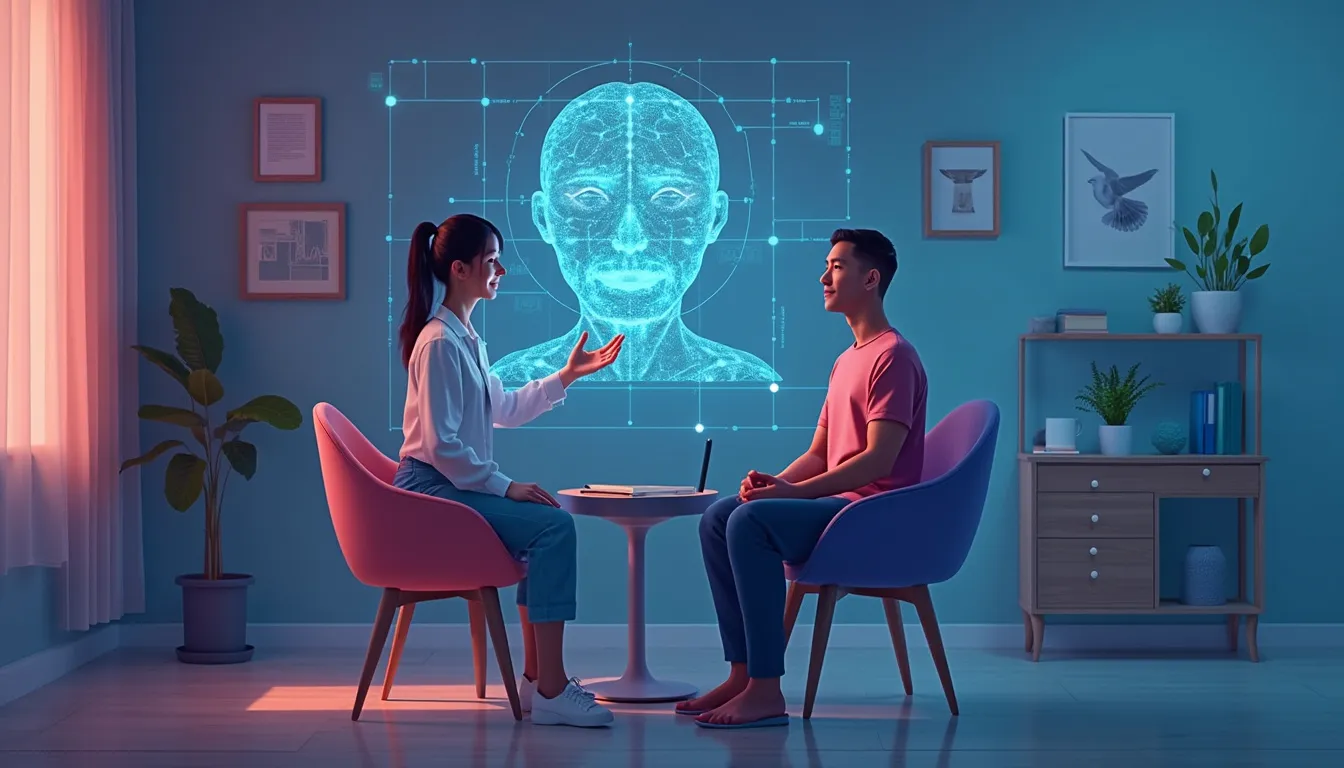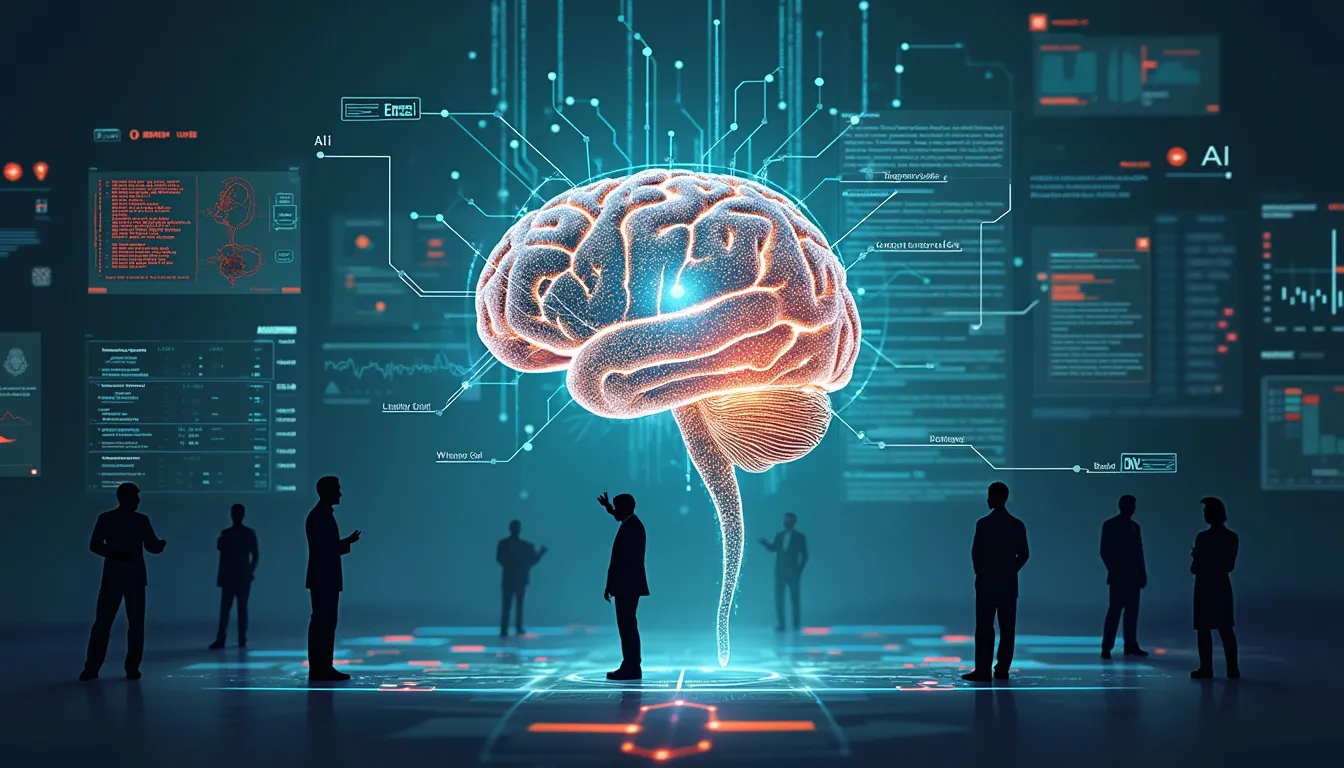In recent years, artificial intelligence (AI) has made significant strides across various sectors, from finance to healthcare, revolutionizing the way we solve complex problems. One of the most poignant and transformative applications of AI is in the field of mental health. As mental well-being becomes an increasingly crucial aspect of our lives, especially amid rising awareness and acknowledgment of mental health issues, the intersection of AI and mental health emerges as a groundbreaking frontier. This confluence holds the promise of not only enhancing the accessibility and quality of mental health care but also personalizing and augmenting the support systems available to individuals struggling with mental health conditions.
Imagine a world where AI-powered tools can detect subtle signs of anxiety or depression before they escalate, or consider the potential of virtual counselors offering empathetic and effective therapy sessions on demand. The intersection of AI and mental health is more than just an intriguing concept—it is a transformative force changing how we approach mental health care. By leveraging sophisticated algorithms and vast data sets, AI technology is revolutionizing diagnostic processes, personalizing treatment plans, and making mental health resources more accessible and affordable to a broader population.
In this article, we delve deeper into how the intersection of AI and mental health is coming to fruition. We will explore the innovative AI-powered tools and applications already making waves in this domain, articulate the profound benefits these technologies convey, and critically examine the challenges and ethical considerations that come with integrating AI into mental health care. Whether you are a mental health professional, a tech enthusiast, or someone personally invested in mental health matters, this exploration of AI’s role in mental health promises to enlighten and inspire actionable insights.
The intersection of AI and mental health epitomizes a significant milestone in both technology and healthcare. This dynamic fusion is not merely a byproduct of technological advancement but a thoughtful convergence aiming to address one of the most pressing issues of our time: mental health. With AI’s ascendance in sectors like finance, healthcare, education, and entertainment, its infiltration into mental health care was inevitable. This revolutionary confluence holds the potential to transform how we understand, diagnose, and treat mental health conditions.
Brief Overview of the Rise of AI in Various Sectors
AI, or Artificial Intelligence, has seen exponential growth and integration into various industries over the past decade. In finance, AI algorithms are optimizing trading strategies and managing risk. In healthcare, AI models are assisting in diagnosing diseases with remarkable accuracy. Educational platforms leverage AI to personalize learning experiences, while entertainment services use AI to recommend content tailored to individual preferences. This widespread adoption is driven by AI’s ability to process vast amounts of data and provide insights that human analysis alone might miss.
Importance of Mental Health in Today’s Society
Mental health has come to the forefront of societal concerns, especially with the onset of the COVID-19 pandemic. Lockdowns, social isolation, and the resultant economic challenges have amplified stress, anxiety, and depression, making mental health care more critical than ever. A survey by the World Health Organization (WHO) indicated that approximately one in four individuals worldwide are affected by mental or neurological disorders at some point in their lives. However, the stigma surrounding mental health and the shortage of mental healthcare providers often create barriers to access and effective treatment.
Introducing How AI Technology is Revolutionizing Mental Health Care
Here comes the watershed moment: the intersection of AI and mental health care. AI’s capabilities in data processing, pattern recognition, and predictive analytics can redefine traditional approaches to mental health. From AI-powered chatbots providing immediate support to predictive algorithms identifying early signs of mental health issues, the applications are both diverse and profound. AI’s integration into mental health isn’t about replacing human professionals but augmenting their ability to deliver timely, personalized, and effective care.
For example, consider the story of Sarah, who battled severe anxiety for years. Traditional therapy sessions didn’t fit her demanding work schedule, and the elongated wait times added to her stress. Sarah’s turning point came when she began using an AI-powered mental health app. The app’s chatbot provided immediate support and coping strategies tailored to her specific triggers and patterns. Over time, the app’s algorithm detected subtle changes in her behavior, prompting her to seek expedited professional help. This seamless marriage of AI and mental health care not only enhanced Sarah’s wellbeing but also showcased the practical benefits of this technological union.
The intersection of AI and mental health marks a significant paradigm shift. One of the standout aspects is AI’s ability to provide continuous, real-time support. Unlike traditional models where help is often periodic and scheduled, AI-enabled tools offer round-the-clock assistance. This is particularly beneficial for individuals experiencing acute episodes of distress, for whom immediate intervention can be critical. Additionally, AI-driven platforms can help in destigmatizing mental health issues by providing anonymous and judgment-free zones where users feel comfortable seeking help.
It’s also noteworthy to mention the role of AI in research and data collection for mental health. AI can analyze vast datasets from diverse sources – clinical records, social media posts, wearable devices – to uncover trends and correlations that might escape human researchers. This data-driven approach allows for the identification of risk factors and early warning signs, thereby contributing to prevention strategies and more effective treatment protocols.
Moreover, the personalization of mental health care through AI cannot be understated. Just as no two individuals are alike, their paths to mental wellness vary significantly. AI’s capacity to learn and adapt means it can tailor interventions that account for an individual’s unique circumstances, history, and preferences. This personalized approach fosters better engagement and outcomes, as users receive care that resonates with their specific needs.
While Sarah’s story offers a glimpse into the transformative potential at the intersection of AI and mental health, it’s essential to recognize the broader implications. AI tools can democratize mental health care by making it more accessible, affordable, and effective. For populations in remote or underserved areas where mental health resources are scarce, AI can bridge the gap, bringing essential services to those in need. This transformation is just the tip of the iceberg, with countless possibilities waiting to be explored.

AI-Powered Tools and Applications in Mental Health
The intersection of AI and mental health is facilitating remarkable advancements in therapeutic methods and personalized care. One of the most notable developments is the emergence of AI-based therapy chatbots and virtual counselors. These applications leverage natural language processing and machine learning to provide users with real-time support and guidance. A prime example is the AI chatbot Woebot, designed to help individuals manage their mental health. Woebot offers cognitive behavioral therapy (CBT) techniques, tracks mood changes, and engages users in therapeutic conversations.
Furthermore, the integration of AI in early detection and diagnosis of mental health conditions manifests the transformative potential of technology. AI algorithms can analyze vast amounts of data to identify patterns and predict mental health issues even before they become apparent. For instance, one study utilized an AI model to scan social media posts, flags potential signs of depression or anxiety based on language patterns. Such proactive approaches enable timely interventions, significantly improving outcomes.
Another critical area where AI intersects with mental health is in the creation of personalized treatment plans. Traditional mental health care often follows a one-size-fits-all model, but AI can customize therapies based on individual needs and responses. IBM’s Watson Health, for example, uses AI to analyze a patient’s history, genetic information, and current health data to recommend personalized treatment options. This nuanced approach ensures that patients receive tailored care, leading to better adherence and efficacy.
Several successful AI tools exemplify the intersection of AI and mental health through AI-powered tools. One such tool is Ginger, an on-demand mental health platform that provides users with chat-based therapy and mental health coaching. Ginger uses AI to match users with appropriate therapists, track their progress, and offer support tailored to their specific needs. Another example is Youper, a mental health app that incorporates AI to offer emotional health assessments and short therapeutic exercises, facilitating users’ self-improvement journey.
In my own professional journey, leveraging AI for mental health care has been both a fulfilling and challenging experience. On a personal note, managing ADHD and OCD has endowed me with an acute understanding of the necessity of adaptive and responsive mental health solutions. AI tools like those mentioned have been instrumental in my own progress, offering tailored strategies that have proved incredibly effective. These personal experiences underscore the broader impact such technologies can have when integrated thoughtfully and empathetically into care frameworks.
As we continue to explore the intersection of AI and mental health, it becomes evident that these AI-powered tools are more than just technological innovations. They embody a paradigm shift in how we approach mental health care, focusing on accessibility, personalization, and early intervention. The journey is ongoing, but with each advancement, we move closer to a world where mental health support is universally accessible and infinitely more effective.

Benefits of AI in Enhancing Mental Health Care
The intersection of AI and mental health offers a promising frontier for advancing care, aiding both professionals and patients. The digital revolution has brought significant benefits, making mental health care more accessible and effective. Below, we delve into four key benefits that illustrate this transformation.
Increased Accessibility to Mental Health Resources
One of the most profound benefits of AI in mental health care is the increased accessibility to resources. Imagine a rural area with limited access to mental health professionals; this scenario often results in individuals not receiving the help they need. AI-powered platforms can bridge this gap. For example, AI-based chatbots like Woebot provide cognitive-behavioral therapy (CBT) to users anytime and anywhere. Such tools break down geographical and financial barriers, ensuring that support is just a few clicks away.
I’ve personally seen how life-changing this can be. Managing ADHD and OCD means I often need quick access to mental health support. AI-enabled apps on my phone offer immediate coping strategies designed for my specific needs, demonstrating the profound intersection of AI and mental health benefits.
Cost-Effective Solutions for Therapy and Counseling
Traditional therapy and counseling sessions can be prohibitively expensive for many. AI offers a cost-effective solution that doesn’t compromise on quality. AI algorithms can analyze patient data, identify patterns, and suggest interventions, significantly reducing the number of required in-person sessions. This means lower costs for patients and the healthcare system alike.
Consider the case of an AI-driven platform that employs natural language processing to analyze a patient’s speech and text interactions. By doing so, it can monitor mental health statuses and provide real-time feedback. These digital assistants can handle preliminary assessments and ongoing monitoring, thereby cutting down on the number of face-to-face visits needed.
Enhanced Accuracy in Diagnosis and Treatment Customization
Another major advantage of AI is its ability to enhance the accuracy of mental health diagnoses and tailor treatments to individual needs. Traditional diagnostic methods can be subjective and time-consuming. Conversely, AI systems can analyze vast amounts of data quickly and objectively, identifying subtle indicators that might be missed by human eyes.
Take, for instance, IBM’s Watson. By processing enormous datasets from numerous studies, Watson aids clinicians in developing personalized treatment plans based on the latest research. This kind of precision is invaluable, especially for complex conditions like mine, which include ADHD, OCD, and managing weight loss—all requiring nuanced and individualized care plans. Mental health professionals can now leverage these AI insights to optimize their treatment strategies, ensuring patients get what they uniquely need.
Additionally, the intersection of AI and mental health benefits individuals by providing insights that are finely tuned to personal health trends. My experiences have shown that customized interventions make an enormous difference in effective treatment.
Real-Time Monitoring and Support for Mental Health Patients
Real-time monitoring is another significant benefit that AI brings to mental health care. Wearable devices and mobile apps, powered by AI, continuously track physiological and behavioral data. Metrics such as sleep patterns, heart rate variability, and even voice tone can offer crucial insights into an individual’s mental state.
An example that embodies this benefit is Fitbit’s collaboration with health-tech companies to develop stress management tools. These tools use AI to analyze biometric data and offer real-time recommendations, helping users manage stress proactively. For someone managing ADHD like myself, having real-time alerts and coping strategies at my fingertips can mean the difference between a productive day and a challenging one.
Even the small victories matter in mental health journeys. I recall a particularly stressful period when my wearable device detected increased heart rate variability and suggested a guided breathing exercise. This timely intervention helped me center myself, showcasing the real-time benefits of AI in mental health care.
In conclusion, the intersection of AI and mental health benefits is multi-faceted, ranging from increasing accessibility and cost-effectiveness to providing enhanced diagnostic accuracy and real-time support. As we continue to embrace AI, these benefits will only grow, offering more effective and personalized mental health care solutions for all.

Challenges and Ethical Considerations
As we delve into the intersection of AI and mental health, it’s crucial to address the challenges and ethical considerations that accompany this technological evolution. While AI’s potential to revolutionize mental health care is undeniable, the path forward is strewn with obstacles that need careful navigation.
Potential Risks and Drawbacks of Relying on AI in Mental Health
The transformative power of AI in mental health care comes with inherent risks. One significant concern is the reliability of AI in diagnosing and treating mental health conditions. AI algorithms are only as good as the data they are trained on, and biases in these datasets can lead to misdiagnoses or inappropriate treatments.
For instance, consider a scenario where an AI tool developed to screen for depression has been predominantly trained on data from a particular demographic. This can result in skewed diagnostic outcomes, rendering the tool less effective or even harmful when applied to more diverse populations. Such biases not only jeopardize patient care but also undermine trust in AI-driven solutions.
Privacy and Data Security Concerns
One of the most pressing ethical issues at the intersection of AI and mental health is privacy. The sensitive nature of mental health data demands rigorous measures to ensure confidentiality and security. Data breaches can have devastating consequences, exposing patients’ private struggles to unauthorized parties and potentially leading to stigma and discrimination.
Imagine a breach where the records of individuals undergoing therapy for anxiety are leaked. The fallout could include not only personal distress but also social and professional repercussions. To mitigate these risks, it’s imperative that stakeholders develop and enforce robust data protection protocols.
Ethical Implications of AI Decision-Making in Mental Health Care
AI’s role in decision-making processes within mental health care raises profound ethical questions. Machines lack the empathy and nuanced understanding that human clinicians bring to the table. This gap can impact the patient-provider relationship, reducing the quality of care.
For example, consider an AI system designed to recommend treatment plans based solely on algorithmic analysis. While such recommendations may be efficient, they might miss the individualized care essential for effective mental health treatment. Furthermore, there’s the danger of patients feeling dehumanized when interacting with AI-based systems, which could deter them from seeking help.
Additionally, accountability becomes a grey area. In cases where AI systems make erroneous decisions, it becomes challenging to pinpoint responsibility. Is it the developers, the clinicians relying on the AI, or the AI itself? Establishing clear guidelines and ethical frameworks is essential to address these ambiguities.
Future Prospects and Necessary Regulations for Safe AI Integration
Despite these challenges, the future of AI in mental health is promising, provided we adopt a cautious and informed approach. Developing comprehensive regulations and guidelines is key to ensuring the safe and ethical integration of AI technologies.
For instance, policymakers must impose stringent requirements for data handling to safeguard privacy. On the technical side, developers should strive for greater transparency in AI algorithms, allowing for external audits and validations. Engaging diverse stakeholders, including patients, healthcare providers, and ethicists, in the development process can help create more balanced and equitable AI solutions.
Moreover, ongoing education and training for clinicians on the effective use of AI tools can bridge the gap between technology and human care. Clinicians equipped with the necessary knowledge can better interpret AI’s outputs and integrate them into personalized care strategies.
In conclusion, navigating the intersection of AI and mental health involves balancing innovation with caution. By addressing the inherent challenges and ethical considerations head-on, we can harness AI’s potential to enhance mental health care while safeguarding the well-being and trust of those it aims to serve.
As we stand at the intersection of AI and mental health, it is evident that technology holds remarkable promise for transforming how we approach mental health care. The rise of AI across various sectors has paved the way for innovations that could revolutionize an area as critical and sensitive as mental health. From AI-powered therapy chatbots and virtual counselors to tools for early detection and personalized treatment, advancements in artificial intelligence offer substantial benefits that include increased accessibility, cost-effective solutions, and enhanced accuracy in diagnosis and treatment customization.
However, navigating this intersection is not without its challenges and ethical considerations. The potential risks of over-reliance on AI, concerns about privacy and data security, and the ethical implications of AI decision-making are significant factors that must be judiciously addressed. Ensuring robust regulations and safeguards is paramount for integrating AI into mental health care safely and effectively.
Drawing from my own experiences, both personal and professional, I understand the complexities that come with balancing innovative technological solutions against the unique and often delicate needs of mental health patients. Managing ADHD, OCD, and personal challenges such as weight loss has underscored for me the importance of empathy and personalized care—qualities that AI technology aims to enhance but can never fully replicate.
Therefore, as we advance towards a future where AI becomes an integral part of mental health care, it is imperative that we maintain a human-centric approach. Let us ensure that these technological advancements serve to complement the invaluable human touch rather than replace it. By fostering a balanced integration of AI, we can aim for a holistic approach that maximizes the benefits while mitigating the potential drawbacks.
In conclusion, the intersection of AI and mental health offers an exciting frontier with the potential to significantly improve the quality of mental health care. As professionals and as a society, our call to action is clear: adopt these technologies thoughtfully, address the challenges diligently, and always keep the well-being of individuals at the forefront. With a blend of innovation and empathy, we can create a future where mental health resources are more accessible, effective, and supportive for all.
Support Us: Check out our recommended products on Amazon.

